|
|
|
Sort Order |
|
|
|
Items / Page
|
|
|
|
|
|
|
| Srl | Item |
| 1 |
ID:
156651
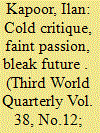

|
|
|
|
|
| Summary/Abstract |
This article carries out a psychoanalytic critique of Post-Development, arguing that the latter’s inattention to the unconscious underpinnings of power not only leaves it unable to explain why development discourse persists, but also deprives it of a radical politics, resulting in a surrender to global capitalism. Drawing on the work of Escobar, Ferguson and Esteva, the article valorises Post-Development’s important insights on the production of development discourse and its attendant power mechanisms. But using a Lacanian lens, it also probes Post-Development’s failure to address how power is mediated at the level of the subject: in maintaining that (capitalist) development is produced discursively in a cold, impersonal way (like an ‘anti-politics machine’), Post-Development ignores the fact that such power is only able to take hold, expand and, crucially, persist through unconscious libidinal attachments (e.g. desires, enjoyment). This failure leaves Post-Development with few resources – beyond localised resistance (Escobar, Esteva) or the call for a universal basic income (Ferguson) – to address the structural challenges of global capitalism. Psychoanalytically speaking, such a (Left) position appears to manifest a secret desire that nothing too much must change: Post-Development may well criticise the disciplinary mechanisms of neoliberal development, but ultimately it engages in an unconscious acceptance of capitalism.
|
|
|
|
|
|
|
|
|
|
|
|
|
|
|
|
| 2 |
ID:
156650


|
|
|
|
|
| Summary/Abstract |
While post-development theory is very concerned with the ways in which development has impacted upon the countries of the Global South, there has been relatively little written on post-development theory from an African perspective. This paper identifies some of the ways in which post-development theory fails to adequately understand the African experience of development. In particular, I explore the difficulty that post-development theory confronts when faced with the continued desire on the part of many people in Africa for development. In his introduction to the new edition of The Development Dictionary, Wolfgang Sachs discusses this desire, noting that despite development’s many failures, many still associate the concept with self-affirmation and redress. He explains this continued desire for development as being indicative of the need for the decolonisation of the imagination. In this paper, I show some of the problems with this explanation and present alternative ways of understanding the persistence of the desire for development in Africa.
|
|
|
|
|
|
|
|
|
|
|
|
|
|
|
|
| 3 |
ID:
156649
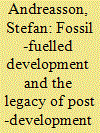

|
|
|
|
|
| Summary/Abstract |
This article examines the legacy of Post-Development theory, in particular its relevance and applicability to debates about Africa’s future. It scrutinises Post-Development theory, and its claims about the end of development, through the prisms of Africa’s continued pursuit of development and its political economy of energy. It considers the impact of these aspects of Africa’s developmental efforts on the ability of Post-Development theory to remain relevant in light of recent developments. Revisiting basic claims of Post-Development theory provides insights into the enduring disconnect and incommensurability between Africa’s twenty-first century socio-economic trajectories and the core assumptions of Post-Development theory.
|
|
|
|
|
|
|
|
|
|
|
|
|
|
|
|
| 4 |
ID:
156654
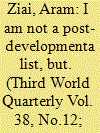

|
|
|
|
|
| Summary/Abstract |
During the course of the 1990s, the Post-Development school emerged as an innovative though controversial approach in development studies. The article examines its critical reception in the textbooks and the extent to which its authors and arguments have become influential. It argues that the relationship between development studies and Post-Development is characterised simultaneously by (sometimes explicit, sometimes implicit) rejection and integration. Examining a number of current development studies textbooks, it illustrates the growing influence of Post-Development arguments and how they have been tacitly or consciously taken up while often rejecting Post-Development per se.
|
|
|
|
|
|
|
|
|
|
|
|
|
|
|
|
| 5 |
ID:
156647
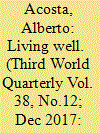

|
|
|
|
|
| Summary/Abstract |
In various parts of the world, growing and serious problems, especially economic, social and environmental, are increasingly calling into question the conventional ideas of progress. The lives of human beings are in danger. We are in ‘the age of survival’, a sort of crossroads in which the future of the human species is defined. That is why alternatives that exceed the dominant concepts typical of Modernity are arising from many sectors and places. Above all, natives are determined to recover their origins and even to strengthen their ancestral practices, from their past to project into the future. And there are those who try to build bridges between these different shores, from which it may be possible to build other worlds where life with dignity for all beings existing on the planet is a possibility.
|
|
|
|
|
|
|
|
|
|
|
|
|
|
|
|
| 6 |
ID:
156653
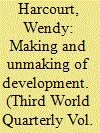

|
|
|
|
|
| Summary/Abstract |
This article explores the ways in which western modernity, as Boaventura De Sousa Santos suggests, can play tricks on intellectuals when we try to teach revolutionary ideas in reactionary institutions. I reflect on my efforts to use Post-Development (PD) as a tool to engage students in critical reflections on development in a post graduate course in 2015/2016. One of their assignments was to create an International Institute of Social Studies (ISS) Development Dictionary emulating the Sachs’s collection. The results were mixed. On the one hand, they produced wonderful digital collations of concepts, ideas and critiques, but on the other hand, many felt that learning about PD had turned their world upside down. Given the strong reactions of the students, and also my colleagues, I reflect on the possibilities and also the problems of using PD as a tool to teach development studies to international students (most of whom are from the Global South). My experiment in asking students to engage in their own ‘unmaking of development’ recorded in their evaluations, a series of interviews, and my own and other colleagues’ reflections sets out the difficulty of unsettling apparent truths of development processes even in progressive institutes at the interface of activism and academe.
|
|
|
|
|
|
|
|
|
|
|
|
|
|
|
|
| 7 |
ID:
156644
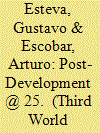

|
|
|
|
|
| Summary/Abstract |
Escobar and Esteva engage in a retrospective conversation on Post-Development, reassessing the critiques and discussing openly the meaning of ‘living beyond development’ today. Some of the topics covered include: how the development discourse has shaped mentalities and practices; the tensions and contradictions in the institutional world, trapped in their compulsion for development in the face of the multiple crisis plaguing the world; the new manifestations of the resistance to development; and the relevant experiences that anticipate the new worlds beyond development and patriarchal capitalist modernity and towards the pluriverse.
|
|
|
|
|
|
|
|
|
|
|
|
|
|
|
|
| 8 |
ID:
156643
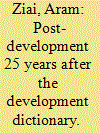

|
|
|
|
|
| Summary/Abstract |
Few books in the history of development studies have had an impact like The Development Dictionary – A Guide to Knowledge as Power, which was edited by Wolfgang Sachs and published by Zed Books in 1992, and which was crucial in establishing what has become known as the Post-Development (PD) school. This special issue is devoted to the legacy of this book and thus to discussing PD.
|
|
|
|
|
|
|
|
|
|
|
|
|
|
|
|
| 9 |
ID:
156646
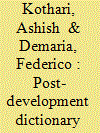

|
|
|
|
|
| Summary/Abstract |
This article lays out both a critique of the oxymoron ‘sustainable development’, and the potential and nuances of a Post-Development agenda. We present ecological swaraj from India and Degrowth from Europe as two examples of alternatives to development. This gives a hint of the forthcoming book, provisionally titled The Post-Development Dictionary, that is meant to deepen and widen a research, dialogue and action agenda for activists, policymakers and scholars on a variety of worldviews and practices relating to our collective search for an ecologically wise and socially just world. This volume could be one base in the search for alternatives to United Nations’ 2030 Agenda for Sustainable Development, in an attempt to truly transform the world. In fact, it is an agenda towards the pluriverse: ‘a world where many worlds fit’, as the Zapatista say.
|
|
|
|
|
|
|
|
|
|
|
|
|
|
|
|
| 10 |
ID:
156648
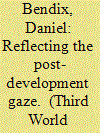

|
|
|
|
|
| Summary/Abstract |
Post-Development has reproduced the ‘development gaze’ by focusing on interventions and struggles in the South. This paper draws attention to the German version of degrowth, Postwachstum, as a possible Post-Development approach in the North. It thus contributes to the Post-Development agenda by including the North as a ‘development’ problem and by overcoming the view of the North as a homogeneous neo-liberal, capitalist, Eurocentric bloc. The paper examines key Postwachstum contributions with regard to their correspondence to insights of and gaps in the Post-Development debate. It argues that Postwachstum needs to include a postcolonial perspective on global inequalities and question the ‘development’–modernity–coloniality nexus more profoundly in order to provide a valuable contribution to the Post-Development agenda.
|
|
|
|
|
|
|
|
|
|
|
|
|
|
|
|
| 11 |
ID:
156645


|
|
|
|
|
| Summary/Abstract |
Comparing the Agenda 2030 of the United Nations and the Laudato si’ by the Pope, both authored in 2015, one point stands out: the Development enthusiasm of the twentieth century is gone. In its place, we are now dealing with the demise of expansive modernity. The motto of the previous century (playing on words of the Lord’s Prayer), ‘on Earth as in the West’, now seems like a threat. The world is in crisis roundabout: the biosphere is being shattered and, in more ways than one, the gap between the rich and the poor is widening. While both publications agree that the global economic model can now be considered old iron, there are equally significant differences. While the Agenda 2030 seeks to repair the existing global economic model significantly, the encyclical calls for a pushing back of economic hegemony and for more ethical responsibility on all levels. While the Agenda 2030 envisions a green economy with social democratic hues, the encyclical foresees a post capitalist-era, based on a cultural shift towards eco-solidarity.
|
|
|
|
|
|
|
|
|
|
|
|
|
|
|
|
| 12 |
ID:
156652
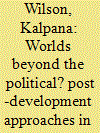

|
|
|
|
|
| Summary/Abstract |
This article considers some ways in which one strand of post-development thinking has influenced non-governmental organisation (NGO)-led activist discourses and practices of transnational solidarity. It argues that there has been a tendency for these discourses and practices to rearticulate racialised constructions of unspoiled and authentic ‘natives’ requiring protection which are historically embedded in colonial practices of governance. In turn, this has meant the failure to acknowledge indigenous histories of political organisation and resistance. Further, the characterisation of development in binary terms as both homogeneous and always undesirable has meant the delegitimisation of demands for equality as well as the neglect of the implications of the decisive shift from developmentalism to neoliberal globalisation as the dominant paradigm. Drawing upon a discussion of aspects of the local, national and transnational campaign to prevent proposed bauxite mining in the Niyamgiri hills in Odisha (India), I argue that given that international NGOs are themselves embedded in the architecture of neoliberal development and aid, their campaigning activities can be understood as facilitating the displacement and marginalisation of local activists and silencing their complex engagements with ideas of development. This potentially defuses and depoliticises opposition to neoliberal forms of development, while transposing collective agency onto undifferentiated publics in the Global North, processes which, however, continue to be actively resisted.
|
|
|
|
|
|
|
|
|
|
|
|
|
|
|
|
|
|
|
|
|